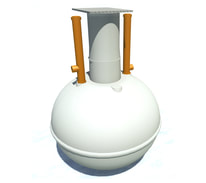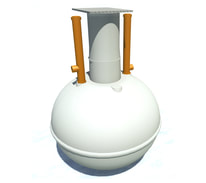Septic Tanks, Cesspits and Small Sewage Treatment Plants
One of the problems we have with the River Char (and the streams that run into it) is the fact that many properties in our parishes are not connected to the mains drainage system.
Faulty, leaking and overflowing septic tanks, cesspits and sewage treatment plants are responsible for a significant amount of pollution in the river (the other main source is agricultural land management practices).
From January 1 2020, it became illegal for any septic tank in England to discharge effluent directly into a watercourse such as a river, stream or pond; any that do must either be replaced or upgraded.
We have prepared two leaflets summarising the key things you can do to look after your domestic sewage system and make sure it doesn't contribute to polluting the river. You can download the short, A5 leaflet here and the longer, more detailed leaflet (with a case study) here.
You can also watch the detailed 'Septic Tanks and the Environment' presentation by Ali Morse from the Watercress and Winterbournes meeting in January 2023.
Or read on for the detail:
Faulty, leaking and overflowing septic tanks, cesspits and sewage treatment plants are responsible for a significant amount of pollution in the river (the other main source is agricultural land management practices).
From January 1 2020, it became illegal for any septic tank in England to discharge effluent directly into a watercourse such as a river, stream or pond; any that do must either be replaced or upgraded.
We have prepared two leaflets summarising the key things you can do to look after your domestic sewage system and make sure it doesn't contribute to polluting the river. You can download the short, A5 leaflet here and the longer, more detailed leaflet (with a case study) here.
You can also watch the detailed 'Septic Tanks and the Environment' presentation by Ali Morse from the Watercress and Winterbournes meeting in January 2023.
Or read on for the detail:
Your sewage – Your river

Important information for households with septic tanks & small sewage treatment plants What are septic tanks and small sewage treatment plants? If your home is not connected to the mains sewage system, your toilets, bath, showers, sinks and washing machine will drain into one of the following:
Tips to save you money and keep our river clean... Faulty and overflowing cesspits, septic tanks and treatment plants cause serious river pollution. Looking after your tank or treatment plant will keep our river cleaner and safer and save you money in the long run. If you have a holiday let, please make sure visitors/staff/cleaners know these tips and display this flyer in the kitchen and bathroom. 5 top tips to keep your system working well:
Other sources of help:
|
Ali Morse gave Hampshire's Watercress and Winterbournes group a fantastic talk on Septic Tanks and the Environment in January 2023.
You can see the presentation slides here. Below are links to further resources: • Legal requirements • General Binding Rules • Discharges to surface water • Discharges to groundwater • Apply for a Permit: • British Water Accredited Engineer list • Natural England Report • Ethical Consumer Dishwasher Detergent Review • State of our Rivers Report • Water UK ‘21st Century Rivers Report • Environment Agency WFD Data 
ALL TYPES OF TANKS NEED TO BE EMPTIED REGULARLY! What are the rules?
If you need more information, are unable to follow the rules, are worried your system may be causing pollution or want to check if your system needs a permit, go to www.gov.uk/small-sewage-rules If you’d like to receive an independent health check of your septic tank, please get in touch. We’re currently looking at ways we could offer this service. If we are successful in securing funding to do it, we’ll get back in touch to work out next steps. It would be helpful to have an idea of the level of interest to support our search for funding. Contact: [email protected] To contact the Environment Agency: Email: [email protected] Telephone: 03708 506 506 (8am to 6pm, Mon to Fri) Incident hotline: 0800 80 70 60 (24 hours, 7 days a week) Defra's list of companies registered to empty your tank, is here |

